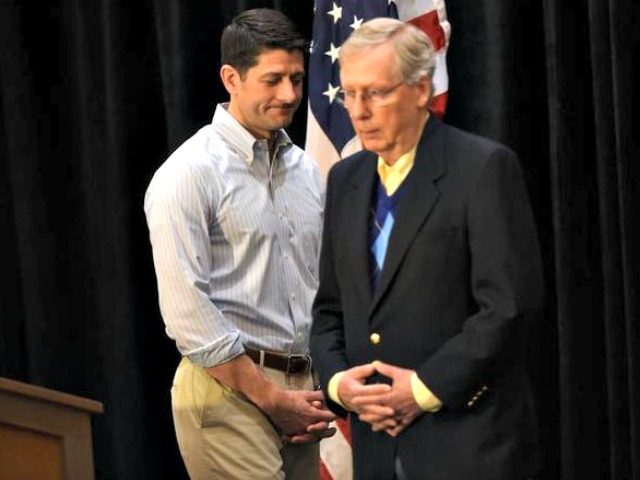Speaker Paul Ryan unveiled Thursday night that he will work with Senate Majority Leader Mitch McConnell on a compromise healthcare bill in a conference committee between the two chambers of Congress.
Speaker Ryan’s office released a statement:
It is now obvious that the only path ahead is for the Senate to pass the narrow legislation that it is currently considering. This package includes important reforms like eliminating the job-killing employer mandate and the requirement that forces people to purchase coverage they don’t want. Still it is not enough to solve the many failures of Obamacare. Senators have made clear that this is an effort to keep the process alive, not to make law. If moving forward requires a conference committee, that is something the House is willing to do. The reality, however, is that repealing and replacing Obamacare still ultimately requires the Senate to produce 51 votes for an actual plan. The House remains committed to finding a solution and working with our Senate colleagues, but the burden remains on the Senate to demonstrate that it is capable of passing something that keeps our promise, as the House has already done. Until the Senate can do that, we will never be able to develop a conference report that becomes law. We expect the Senate to act first on whatever the conference committee produces. Obamacare is collapsing and hurting American families. We have to keep working at this until we get the job done.
Sens. Lindsey Graham (R-SC), Ron Johnson (R-WI), John McCain (R-AZ), and Bill Caissidy (R-LA) also revealed on Thursday that they want to use the “skinny repeal” Obamacare bill to force Congress to go to a conference committee rather than have the bill become law.
The thin repeal of Obamacare would repeal Obamacare’s individual and employer mandate, repeal the Affordable Care Act’s medical device tax, defund Planned Parenthood for one year, and increase funds for community health centers.
The four senators want “an ironclad promise” form House Speaker Paul Ryan that they will not pass the skinny Obamacare repeal bill and instead will go into a conference committee — or else they will not vote for the thin Obamacare repeal bill.
Graham said, “The skinny bill as policy is a disaster. I need assurances from the House speaker … if I don’t [get them], I’m a no.”
Sen. Ron Johnson (R-WI) chastised the skinny Obamacare repeal bill. Johnson said, “The skinny repeal bill in the Senate doesn’t even come close to honoring our promise of repealing Obamacare.”
Senate Republicans argue that a skinny repeal of Obamacare would make it easier for the many disparate wings to coalesce around a simple bill that would pass through the upper chamber. If the Senate were to pass a skinny repeal of Obamacare, the House and the Senate could reconcile the differences between the House-passed AHCA and whatever bill that goes through the Senate. After which, the unified congressional healthcare plan would have to pass through both chambers of Congress, and then President Donald Trump could sign the bill.
Majority Leader McConnell told senators this week that Paul Ryan promised to send the skinny bill to a conference committee. Sen. Graham claimed that the House will have to go to conference because Freedom Caucus Chairman Mark Meadows (R-NC) told him that the Caucus will not vote for the thin Obamacare repeal bill.
Senate Majority Whip John Cornyn (R-TX) said that Senate and House leadership will work to go to conference to hash out the differences between the House-passed American Health Care Act (AHCA) and the eventually to be passed Senate healthcare bill.
Cornyn explained, “I believe the leader has been in communication with Speaker [Paul] Ryan on that topic. The request to go to conference has to come from the House, so that would probably be the best people to talk to. But I have every expectation we will.”
Sen. Graham claimed that by going through conference, Republican lawmakers can buy more time to figure out a unified plan that could pass through both chambers of Congress.
House Energy and Commerce Chairman Greg Walden (R-OR) professed, “All options are on the table.”

COMMENTS
Please let us know if you're having issues with commenting.